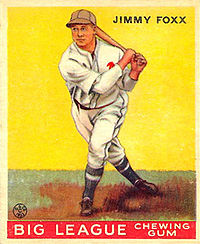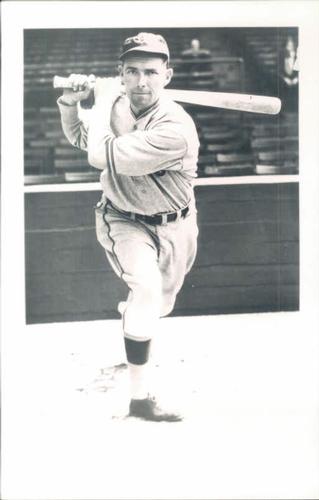July 10, 1932: Athletics outlast Indians in 18-inning slugfest
 On July 10, 1932, the Philadelphia Athletics played the Cleveland Indians in one of the wildest and craziest games in baseball history. An estimated 10,000 fans came to Cleveland’s League Park for the Sunday 3:00 P.M. match-up. Connie Mack, Philadelphia’s 69-year-old manager, sent 20-year-old Lew Krausse to the mound for his third career start. Cleveland manager Roger Peckinpaugh chose 29-year-old Clint Brown as his starting pitcher.
On July 10, 1932, the Philadelphia Athletics played the Cleveland Indians in one of the wildest and craziest games in baseball history. An estimated 10,000 fans came to Cleveland’s League Park for the Sunday 3:00 P.M. match-up. Connie Mack, Philadelphia’s 69-year-old manager, sent 20-year-old Lew Krausse to the mound for his third career start. Cleveland manager Roger Peckinpaugh chose 29-year-old Clint Brown as his starting pitcher.
Brown struggled right away. In the top of the first inning, singles by Doc Cramer, Al Simmons, and Jimmie Foxx, and a fielding error by Brown, produced two Philadelphia runs. Then the Indians jumped on Krausse in the bottom of the inning. After singles by Dick Porter and Johnny Burnett, Earl Averill crushed a ball over the right-field fence for a three-run homer to give the Indians a 3-2 lead. Mack had seen enough of Krausse and replaced him in the second inning with Eddie Rommel, a 34-year-old knuckleballer. In the third inning, Brown served up Foxx’s 31st home run of the season, a solo shot that tied the game at 3-3. Over the next three innings, the Athletics scored three runs on six hits off Brown, and the Indians tallied five runs on seven hits off Rommel. The score after six innings was Cleveland 8, Philadelphia 6.
The Philadelphia hitters rallied with two outs in the top of the seventh inning. Dib Williams slashed a triple down the left-field line. Rommel followed with a single to right field, scoring Williams. Peckinpaugh replaced Brown with Willis Hudlin, who walked the first two batters he faced to load the bases. Peckinpaugh then brought in his 24-year-old ace, Wes Ferrell, despite the fact that Ferrell had pitched a complete game only two days before. Jimmy Dykes greeted Ferrell with a three-run double, and the Athletics regained the lead, 10-8. Simmons followed with a single, scoring Dykes, and Foxx launched a bomb over the left-field fence, his second homer of the game, to increase the lead to 13-8. The Cleveland fans loudly booed their disapproval.
Burnett led off the bottom of the seventh with a single to right field; it was his fifth hit of the game. The next three batters also came through with solid hits — a single by Averill and doubles by Joe Vosmik and Ed Morgan — and the Philadelphia lead was cut to 13-11. With Morgan on second base and no outs, Rommel walked Glenn Myatt on four pitches. Bill Cissell tried to sacrifice but popped his bunt into the air toward Rommel. The veteran pitcher saw an opportunity to turn a double play. He deliberately let the ball hit the ground and then picked it up and threw to second base, but his throw sailed into center field and allowed Morgan to score. Rommel threw his cap in disgust. Later in the inning, Porter’s single drove in Myatt and Cissell, and the Indians went ahead, 14-13. The Cleveland fans cheered boisterously.
There was no scoring in the eighth inning. In the top of the ninth, Ferrell got the first two batters to ground out. One more out was needed to seal a Cleveland victory. Dykes hit an easy grounder to Morgan at first base, but Morgan fumbled it and Dykes was safe at first. The crowd emitted a groan. Ferrell was cautious with Simmons and walked him. The dangerous Foxx stepped to the plate and smacked the ball down the left-field line. The ball got lodged against the bullpen bench, and it took a moment for Vosmik to retrieve it. Meanwhile, Dykes and Simmons scored, and Philadelphia had retaken the lead, 15-14.
Willie Kamm led off the bottom of the ninth with a double down the left-field line. Rommel struck out Ferrell and got Porter to fly out for the second out. One more out was needed to seal a Philadelphia victory. Burnett lined the ball up the middle, and Williams, the second baseman, dove for it and knocked it down. Williams got to his feet, retrieved the ball, and pegged a throw to home plate, but Kamm slid across the plate ahead of the throw with the tying run. The fans cheered themselves hoarse. Averill singled to right field, advancing Burnett to third. One more run would give Cleveland the victory. Vosmik slugged the ball to right-center field for what looked to be the game winner, but center fielder Mule Haas made a spectacular diving catch, with somersault, for the third out.
 The game went into extra innings with the score tied 15-15. After scoring 30 runs in nine innings, the teams went scoreless for the next six innings, as Ferrell and Rommel settled into a groove. In the top of the 16th inning, with a man on, Foxx hit his third home run of the game to give the Athletics a 17-15 lead. Porter led off the bottom of the inning with a double to left-center field. Burnett followed with a single to right field — his ninth hit of the game — and Porter stopped at third base. Averill lifted a sacrifice fly to Haas in center field, scoring Porter. Vosmik singled to right field, advancing Burnett to third, and then Morgan singled to left field to drive in Burnett with the tying run. After Myatt grounded out, Cissell’s drive to deep center field appeared to be the game-winning blow, but Haas made a sensational leaping catch with his back against the outfield wall. After 16 innings, the score was tied 17-17.
The game went into extra innings with the score tied 15-15. After scoring 30 runs in nine innings, the teams went scoreless for the next six innings, as Ferrell and Rommel settled into a groove. In the top of the 16th inning, with a man on, Foxx hit his third home run of the game to give the Athletics a 17-15 lead. Porter led off the bottom of the inning with a double to left-center field. Burnett followed with a single to right field — his ninth hit of the game — and Porter stopped at third base. Averill lifted a sacrifice fly to Haas in center field, scoring Porter. Vosmik singled to right field, advancing Burnett to third, and then Morgan singled to left field to drive in Burnett with the tying run. After Myatt grounded out, Cissell’s drive to deep center field appeared to be the game-winning blow, but Haas made a sensational leaping catch with his back against the outfield wall. After 16 innings, the score was tied 17-17.
There was no scoring in the 17th inning. With two outs in the top of the 18th, Foxx singled to left field. Eric McNair then hit a ball into left field that took a crazy bounce over Vosmik’s head. This allowed Foxx to score the go-ahead run. McNair was thrown out trying to stretch the hit into a triple. In the bottom of the inning Rommel retired Averill, Vosmik, and Morgan in order, striking out both Averill and Morgan. The game, which had lasted 4 hours and 5 minutes, was finally over. The final score was Philadelphia 18, Cleveland 17. Sam Otis, a sportswriter for the Cleveland Plain Dealer, called it “the most dramatic diamond struggle in Cleveland history.”
- Eddie Rommel pitched 17 innings and gave up 14 runs, 29 hits, and 9 walks. Nonetheless, he was the winning pitcher. It was the 171st and final victory of his major-league career.
- Wes Ferrell was the losing pitcher. On short rest, he pitched 11? innings and allowed 8 runs, 12 hits, and 4 walks.
- Cleveland’s 33 hits in one game is a major-league record. Philadelphia had 25 hits.
- Jimmie Foxx went 6-for-9 with 3 home runs and 8 RBIs. His 3 home runs increased his league-leading total to 33 through 81 games of the 1932 season and put him on pace for 62 home runs in 154 games. He finished the season with 58, falling short of Babe Ruth’s record of 60.
- Johnny Burnett went 9-for-11. His 9 hits in one game are a major-league record.
Sources
The author relied on the following source in preparing this article: Cleveland Plain Dealer, July 11, 1932. The statistical records mentioned by the author are based on data retrieved from Retrosheet.org in November 2014.
Additional Stats
Philadelphia Athletics 18
Cleveland Indians 17
18 innings
League Park
Cleveland, OH
Box Score + PBP:
Corrections? Additions?
If you can help us improve this game story, contact us.

